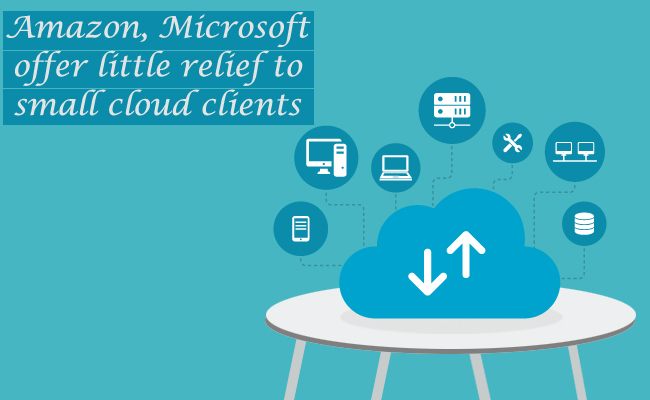Amazon, Microsoft offer little relief to small cloud clients
By MYBRANDBOOK

The ability to rent computing power online has revolutionized the internet economy and turned a trio of companies - Amazon, Microsoft Corp. and Alphabet Inc.’s Google - into the indispensable utilities of the web.
With the economic devastation of Covid-19, entrepreneurs like John Lyotier feel the fate of their businesses rests on the benevolence of their cloud provider. While Amazon Web Services, or AWS, and Microsoft are restructuring some large contracts on a case-by-case basis, according to people familiar with the decisions, smaller companies aren’t receiving the same flexibility. Half a dozen startup executives said recent appeals to these cloud companies have gone unanswered.
While older technology providers, such as Cisco Systems Inc., are offering credits to customers, the major cloud companies haven’t made any public announcements about deferring or cutting bills for clients.
“They’ve been pretty radio silent,” said Jason Kim, co-founder Taloflow, which advises businesses on managing AWS bills.
Cloud providers attracted so many companies over the past decade, in part, with the flexibility of the model. Businesses can start with a credit card, often on a pay-for-what-you-use basis, rather than pay for a back-room server or mainframe computer. Demand drops, and, typically, so does cloud usage and the bill.
But the sales strategy for the big cloud companies has been to ink long-term deals. Customers typically receive discounts on list prices in exchange for minimum spending thresholds. As of the end of December, AWS recorded $29.8 billion, Google recorded $11.4 billion in cloud sales while, Microsoft sells cloud services, as well as much of its on-premise software, via multiyear agreements.
Startups and other companies locked into these contracts feel particularity hurt. “Their revenues have sunk 50% or 60%, but their costs have remained static,” said Kim.
“We treat payment terms with our customers or partners as confidential and we’re not able to disclose details,” a Google Cloud spokesperson said in a statement.
An AWS spokesman said customers can turn off cloud services in a way that wouldn’t be possible with corporate-owned data centers. The company published a blog earlier this month with tips on how to reduce AWS costs during the pandemic. “This is a very difficult time for some of our customers, and we are actively working across a number of dimensions to help them manage costs,” the spokesman said.
Microsoft, like other vendors, generally increases the price when existing customers sign up for another multiyear contract. The company is cutting those mark-ups in response to the pandemic. Microsoft also is giving some clients a discount on money owed for using more services than paid for upfront.
Before the pandemic, Google had been offering a year or 18 months of free productivity tools in an effort to capture Microsoft clients. Google has bolstered those efforts recently.
Microsoft and Google have recently given some customers more time to pay bills, the Information reported earlier.


Legal Battle Over IT Act Intensifies Amid Musk’s India Plans
The outcome of the legal dispute between X Corp and the Indian government c...

Wipro inks 10-year deal with Phoenix Group's ReAssure UK worth
The agreement, executed through Wipro and its 100% subsidiary,...

Centre announces that DPDP Rules nearing Finalisation by April
The government seeks to refine the rules for robust data protection, ensuri...

Home Ministry cracks down on PoS agents in digital arrest scam
Digital arrest scams are a growing cybercrime where victims are coerced or ...


ICONS OF INDIA : RAJIV MEMANI
As Chair of the EY Global Emerging Markets Committee, Rajiv connects e...

Icons Of India : Girish Mathrubootham
Girish Mathrubootham is the Founder of Freshworks (previously known ...

Icons Of India : Deepak Sharma
Deepak Sharma spearheads Schneider Electric India. He brings with him ...


TCIL - Telecommunications Consultants India Limited
TCIL is a government-owned engineering and consultancy company...

EESL - Energy Efficiency Services Limited
EESL is uniquely positioned in India’s energy sector to address ener...

RailTel Corporation of India Limited
RailTel is a leading telecommunications infrastructure provider in Ind...


Indian Tech Talent Excelling The Tech World - PADMASREE WARRIOR, Founder, President & CEO - Fable
Padmasree Warrior, the Founder, President, and CEO of Fable, is revolu...

Indian Tech Talent Excelling The Tech World - Steve Sanghi, Executive Chair, Microchip
Steve Sanghi, the Executive Chair of Microchip Technology, has been a ...

Indian Tech Talent Excelling The Tech World - AJAY BANGA, President - World Bank
Ajay Banga is an Indian-born American business executive who currently...
 of images belongs to the respective copyright holders
of images belongs to the respective copyright holders